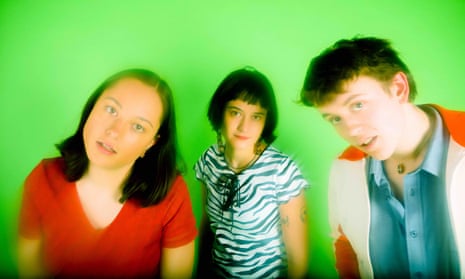Twenty minutes into the gong bath, Orielles vocalist and bassist Esmé Hand-Halford knew that she was ready to do her vocal take. Stockport’s Eve Studios – a shrine containing BBC Radiophonic Workshop memorabilia, original rugs from the 1951 Festival of Britain and Europe’s largest collection of vintage BBC equipment – became, she says, “like a commune” as the mellow, relaxing drone reverberated through the room.
The Orielles are a Halifax trio aged between 21 and 24: Esmé; her sister, Sidonie, on drums; and guitarist Henry Carlyle-Wade. They get heavy rotation on 6Music and are as in demand for their cosmic remixes for other bands as they are for their high-energy festival sets. Their penchant for a notably retro vision of the future means they are the latest exponents of the kind of woozy psychedelia played by Broadcast and Stereolab – bands who remembered the future as if it were yesterday.
When recording their second album, Disco Volador, at Eve, the Orielles worked long into the night, recording 20-minute krautrock jams with their producer, Marta Salogni, rapping in Italian. Carlyle-Wade also took up painting. They were advised against releasing the opening track Come Down on Jupiter as the album’s lead single – weird time signatures, no discernible chorus, jazzy inflections – but held their nerve, wanting to introduce the idea that on this album, space is very much the place. “I class our music as progressive music,” says Carlyle-Wade, who, on stage, pulsates with all the wonky exuberance of David Byrne on his seventh espresso.
Why space? Esme points to the group’s “massive anxiety about the climate crisis”, and the idea of escape from that at a time when “people are so existentially in their own minds because of how shit society is. People think you have to be shouting about politics explicitly, but I think every single song on this album has a political message embedded in it.”
The band tease cryptic possible interpretations as to what Disco Volador actually means – a fictional galactic nightspot? An Italian frisbee? The feeling of flying during a particularly vigorous night out? Certainly, Esmé became fascinated by “the phenomenological sense of being able to experience the emotions you get from dancing. I always say if I could dance every day, if everyone could, it would be amazing.”
The group have been heavily shaped by dance culture. Carlyle-Wade says that covering Korean DJ Peggy Gou’s Itgehane was “highly educational”, their single Sugar Tastes Like Salt was remixed by the late Andrew Weatherall, while both Hand-Halford sisters are DJs in their adopted city of Manchester. This bleeds into an album that is sequenced much like a DJ set. “There’s a creation and dissipation of tension throughout the whole thing,” says Esmé.
The Orielles are part of the first generation of musicians who have only known streaming rather than physical record collecting. It has resulted in a thrillingly healthy disrespect for genre conventions, shuffling from Turkish funk to Italian experimental cinema soundtracks, even within the same song. Their sonic bias towards day-glo optimism is matched by a deadpan surreal humour – try making sense of references to thrift-shop cowboys or seventh dynamic goo. Time’s passage is explored from the perspective of the group’s various cats, on the jazz-influenced Memoirs of Miso and the athletic rave of Bobbi’s Second World.

Some of this, the band point out, comes from their formative years as “the three weirdos in Halifax”. Like their Heavenly labelmates Working Men’s Club, they have emerged from a vibrant West Yorkshire scene incubated by the region’s two excellent independent venues – the Trades Club in Hebden Bridge and the Golden Lion in Todmorden. “It’s not profit-driven – they’re really out there,” explains Esmé. But Sidonie characterises Halifax as “this really boring place … we were confined in these four walls, bouncing off random ideas and conversations as a way out.” The band entered the music industry young. “I was kind of absent from normal teenage stuff,” explains Henry. “I kind of surpassed a big chunk of my life. I did my GCSEs, released the album, toured, and it’s a bit like, what the fuck happened to the past two years? But then that goes into the album, that repetition and sadness.”
Just don’t mistake their age for naivety. “I know we’ve all got baby faces,” Esmé says, “but the age thing has fucked us off beyond belief.” Their plan for their own future now is to keep things weird. “I kind of don’t give a shit, to be honest,” Esmé continues. “I feel like I should, but I don’t.” The correct attitude, surely, on the way to the stars.
Disco Volador is out on 28 February. The band are at Riverside Newcastle on 25 February, then touring until 6 March. They play the BBC Radio 6 Music Festival on 7 March at the Roundhouse, London
Disco Volador is the band’s second album, not their debut. This was corrected on 21 February 2020.

Comments (…)
Sign in or create your Guardian account to join the discussion